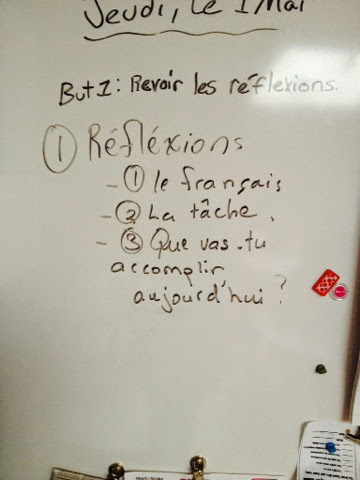I am sharing the process of metacognitive learning by determining individual learning goals and classroom learning goals. This process is the base of a valuable connective platform of reflective conversational classroom community encouraging thinking, communication in learning and being clear about what students have accomplished and what needs to be accomplished.
On a daily basis students are given opportunities to engage in reflections in their learning and determining their next steps. The individual goals are shared with their teams, this collaborative thinking promotes questioning, ownership of learning, clarification of any content misconceptions and students converse about their goal setting of inquiry learning and next steps. This process makes learning transparent and it solidifies the classroom as a learning culture based on what individuals have learned and will reach.
Using one chrome book per team students share their daily documented learning on Google Calenders that is embedded in their sites. As mentioned in previous posts Google is our Learning Platform for all activities.
This connection also takes place face to face and digitally by inviting their colleagues to reply on next steps during learning tasks. They embrace each others' learning by having students voice on how to meet goals and share learning skills and strategies. This creates a nurturing social, transparent and intellectual culture of learners committed by caring about each other's learning.
The following are samples of connective learning:
Teams gather to listen, react and learn about reflective learning goals.
Student on site sharing her reflective learning.
Students' reflections on Google Calender
We have le "professeur du jour" determining our whole group goals.
Not all reflections are digital some students to choose to write them on a daily basis
I wished I had Google glasses as I always miss capturing many rich students ownership moment. I might invest in a pair this summer!
All this learning is also articulated in French not only they are reflecting on their learning that is written in French also enriching their oral French through conversations. Students take risks in a second language and respect all entry levels of learning. Through this process as parents and students admit not only they have learned skills, strategies and content from each other, it has also improved their oral and written French. Through rich conversations on goal setting students take full ownership of learning during their tasks. I will soon be posting more examples of oral rich conversations learning tasks.
We need to provide students with these reflective opportunities online, in writing and face to face to constantly expose perspective of learning through an engaging community.








